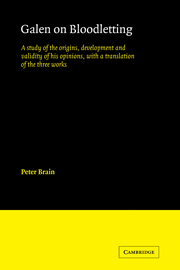 Galen on Bloodletting
Galen on Bloodletting Book contents
- Frontmatter
- Contents
- Preface
- Note on abbreviations and references
- Note on manuscripts and editions
- 1 Galen and his system: an introduction
- 2 Galen's Book on Venesection against Erasistratus (translation)
- 3 Galen's Book on Venesection against the Erasistrateans in Rome (translation)
- 4 Galen's Book on Treatment by Venesection (translation)
- 5 Development of Galen's views and methods as shown in the three works
- 6 Galen, venesection and the Hippocratic Corpus
- 7 Galen's practice of venesection
- 8 Galen's revulsive treatment and vascular anatomy
- 9 The testimony of other writers and the validity of Galen's opinions on sites for venesection
- 10 Galen's use of venesection as an evacuant: can it be justified? A medical digression
- 11 Conclusion
- Glossary
- Works cited
- Index
9 - The testimony of other writers and the validity of Galen's opinions on sites for venesection
Published online by Cambridge University Press: 04 August 2010
- Frontmatter
- Contents
- Preface
- Note on abbreviations and references
- Note on manuscripts and editions
- 1 Galen and his system: an introduction
- 2 Galen's Book on Venesection against Erasistratus (translation)
- 3 Galen's Book on Venesection against the Erasistrateans in Rome (translation)
- 4 Galen's Book on Treatment by Venesection (translation)
- 5 Development of Galen's views and methods as shown in the three works
- 6 Galen, venesection and the Hippocratic Corpus
- 7 Galen's practice of venesection
- 8 Galen's revulsive treatment and vascular anatomy
- 9 The testimony of other writers and the validity of Galen's opinions on sites for venesection
- 10 Galen's use of venesection as an evacuant: can it be justified? A medical digression
- 11 Conclusion
- Glossary
- Works cited
- Index
Summary
No attempt at an exhaustive analysis of the writers between Hippocrates and Galen will be made here. Only a few will be considered; the aim is merely to illustrate the divergent opinions that were prevalent.
Whether or not Celsus was himself a physician, and whether his work is his own or a translation of a lost Greek original, it is of the greatest value in reconstructing medical opinion between the Hippocratic writers and Galen. In addition to many incidental references he devotes a chapter to venesection, which opens with the significant remark: ‘It is not new to let blood by cutting a vein; but that there is hardly any disease in which blood is not let, is new.’ This is, in effect, Galen's indication from the severity of the disease, regardless of its nature; his primary indication for bloodletting is the presence, or indeed only the expectation, of any severe disease whatsoever. According to Celsus this was in his time – some two centuries before Galen, unless he is reproducing an earlier work – a new concept. It cannot be Hippocratic, since Celsus describes Hippocrates as ‘the most ancient author’. As we have seen, the idea appears in the Corpus only in the Appendix to Regimen in Acute Diseases, which most scholars think spurious, although Galen says that this particular statement is good Hippocratic doctrine; this does not apply, however, to everything else in the treatise. It has already been shown that the Hippocratic writers used venesection far less extensively than Galen did, though Galen would like us to think otherwise; Celsus confirms this opinion.
- Type
- Chapter
- Information
- Galen on BloodlettingA Study of the Origins, Development and Validity of his Opinions, with a Translation of the Three Works, pp. 145 - 157Publisher: Cambridge University PressPrint publication year: 1986


